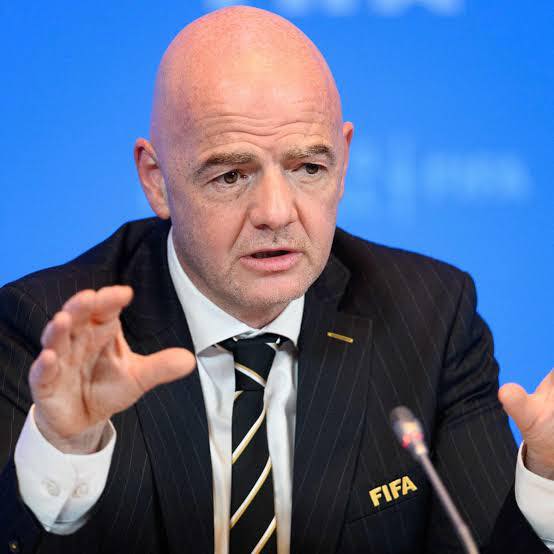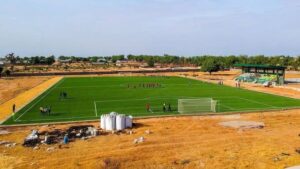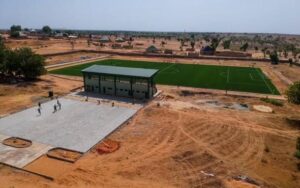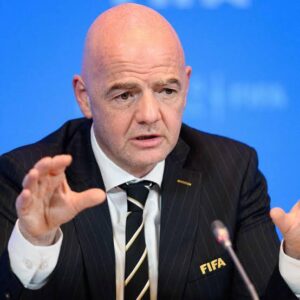The Fédération Internationale de Football Association (FIFA) has found itself at the center of a growing debate after unveiling images of a stadium project it co-funded with the Nigeria Football Federation (NFF).
The facility, reportedly worth $1.2 million (₦1.7 billion), was meant to be part of FIFA’s Forward Development Programme an initiative that supports football infrastructure across member nations. However, recent photos of the completed stadium have triggered nationwide outrage, with many questioning whether the structure justifies its hefty price tag.
The stadium, located in Birnin Kebbi, Kebbi State, was featured on FIFA’s official social media banners earlier this month. Instead of generating praise, the images ignited skepticism about Nigeria’s project management and financial accountability.
FIFA’s Photo Sparks Online Outrage
FIFA’s decision to display the Kebbi stadium on its Facebook and X (formerly Twitter) profiles caused a social media storm. Nigerians quickly noticed the modest appearance of the facility complete with unfinished stands, sparse seating, and limited infrastructure.
Commentators questioned how such a structure could represent a $1.2 million investment. Hashtags like #SaveNigerianFootball and #FIFAProjectNigeria began trending as users demanded transparency from football authorities.
The controversy intensified following viral commentary from Nigerian sports analyst Chinedu Mobike, who alleged that FIFA had allocated $1.2 million for two stadiums—one in Kebbi and another in Ugborodo, Delta State—but that both projects showed underwhelming results.
NFF Denies Mismanagement Allegations
In response to the criticism, the Nigeria Football Federation released an official statement on October 24, 2025, refuting any claims of corruption or fund diversion.
According to the NFF, all FIFA Forward Programme funds are project-tied, transparently managed, and audited at every stage. The federation stressed that it only receives disbursements after FIFA verifies completed phases of work.
The statement also referenced other ongoing projects such as the NFF/FIFA Players’ Hostel and training pitches at the MKO Abiola National Stadium as examples of successful collaboration under the same funding scheme.
Despite these assurances, many Nigerians remain unconvinced, citing the stark visual evidence of a stadium that seems far below expected international standards.
Observers have compared Nigeria’s $1.2 million stadium with similar-budget projects abroad—particularly in China, where comparable funds have produced world-class mini-arenas with modern amenities, floodlights, and spectator facilities.
These comparisons have fueled a broader discussion about value for money, contract oversight, and construction quality in public sector projects. Critics argue that if FIFA funds are strictly monitored, the outcome should visibly reflect the investment.
As of the time of writing, FIFA has not released an official comment beyond the social media imagery that triggered the controversy. The organization’s silence has left room for speculation—some see the photo post as a subtle critique of the NFF, while others believe it was a neutral showcase gone wrong.
Analysts say FIFA’s next move could determine how seriously it treats transparency and quality control in future African infrastructure projects.
Meanwhile, journalists and watchdogs continue to press for details on:
- The breakdown of the ₦1.7 billion cost;
- The contractors and consultants involved;
- Whether an independent audit was conducted;
- And whether FIFA will inspect the site to verify completion standards
The ongoing debate has become a symbol of Nigeria’s wider struggle with public trust in sports governance. While FIFA and the NFF have worked together on multiple successful initiatives, this particular project has renewed calls for transparency, documentation, and performance reporting.
Some Nigerians have urged the National Assembly and sports oversight committees to investigate the project further, ensuring that FIFA funds truly reach the grassroots level of Nigerian football.
The $1.2 million stadium project has become more than just a sports story—it’s now a national conversation about governance, accountability, and the future of football development in Nigeria.
Until FIFA or the NFF provide a detailed clarification, the Kebbi stadium will remain a controversial symbol of what many see as the gap between funding promises and physical results.
FIFA Raises Eyebrows Over $1.2M NFF Stadium

Read Time:3 Minute, 20 Second









